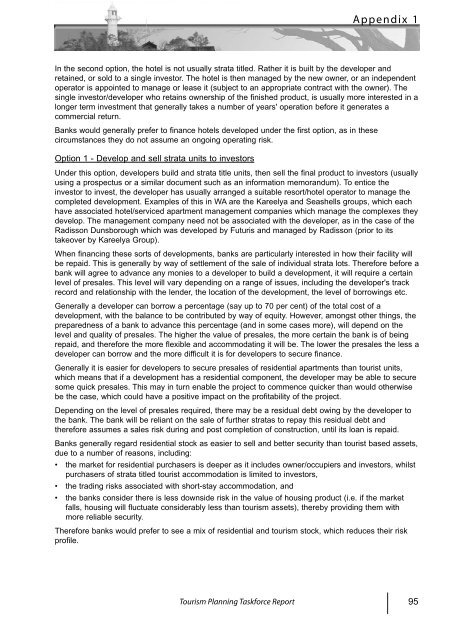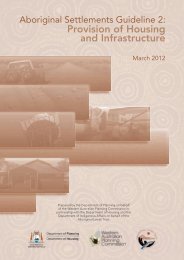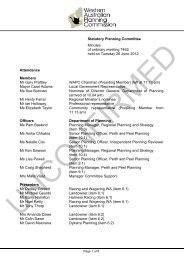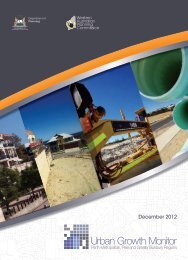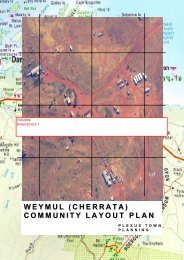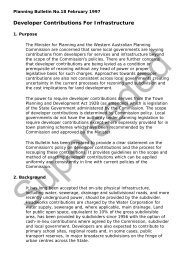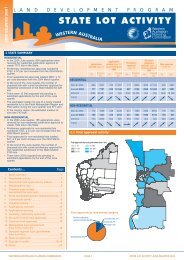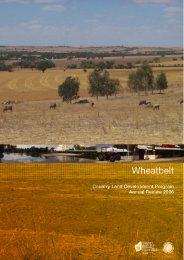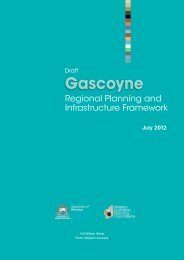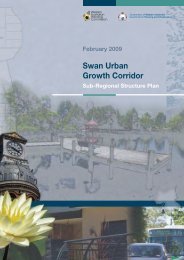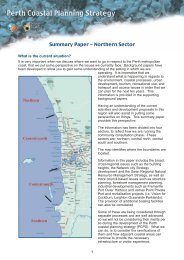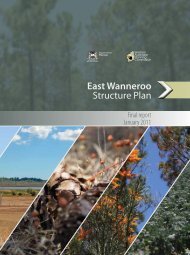Tourism Planning Taskforce Report - Western Australian Planning ...
Tourism Planning Taskforce Report - Western Australian Planning ...
Tourism Planning Taskforce Report - Western Australian Planning ...
- No tags were found...
Create successful ePaper yourself
Turn your PDF publications into a flip-book with our unique Google optimized e-Paper software.
Appendix 1In the second option, the hotel is not usually strata titled. Rather it is built by the developer andretained, or sold to a single investor. The hotel is then managed by the new owner, or an independentoperator is appointed to manage or lease it (subject to an appropriate contract with the owner). Thesingle investor/developer who retains ownership of the finished product, is usually more interested in alonger term investment that generally takes a number of years' operation before it generates acommercial return.Banks would generally prefer to finance hotels developed under the first option, as in thesecircumstances they do not assume an ongoing operating risk.Option 1 - Develop and sell strata units to investorsUnder this option, developers build and strata title units, then sell the final product to investors (usuallyusing a prospectus or a similar document such as an information memorandum). To entice theinvestor to invest, the developer has usually arranged a suitable resort/hotel operator to manage thecompleted development. Examples of this in WA are the Kareelya and Seashells groups, which eachhave associated hotel/serviced apartment management companies which manage the complexes theydevelop. The management company need not be associated with the developer, as in the case of theRadisson Dunsborough which was developed by Futuris and managed by Radisson (prior to itstakeover by Kareelya Group).When financing these sorts of developments, banks are particularly interested in how their facility willbe repaid. This is generally by way of settlement of the sale of individual strata lots. Therefore before abank will agree to advance any monies to a developer to build a development, it will require a certainlevel of presales. This level will vary depending on a range of issues, including the developer's trackrecord and relationship with the lender, the location of the development, the level of borrowings etc.Generally a developer can borrow a percentage (say up to 70 per cent) of the total cost of adevelopment, with the balance to be contributed by way of equity. However, amongst other things, thepreparedness of a bank to advance this percentage (and in some cases more), will depend on thelevel and quality of presales. The higher the value of presales, the more certain the bank is of beingrepaid, and therefore the more flexible and accommodating it will be. The lower the presales the less adeveloper can borrow and the more difficult it is for developers to secure finance.Generally it is easier for developers to secure presales of residential apartments than tourist units,which means that if a development has a residential component, the developer may be able to securesome quick presales. This may in turn enable the project to commence quicker than would otherwisebe the case, which could have a positive impact on the profitability of the project.Depending on the level of presales required, there may be a residual debt owing by the developer tothe bank. The bank will be reliant on the sale of further stratas to repay this residual debt andtherefore assumes a sales risk during and post completion of construction, until its loan is repaid.Banks generally regard residential stock as easier to sell and better security than tourist based assets,due to a number of reasons, including:• the market for residential purchasers is deeper as it includes owner/occupiers and investors, whilstpurchasers of strata titled tourist accommodation is limited to investors,• the trading risks associated with short-stay accommodation, and• the banks consider there is less downside risk in the value of housing product (i.e. if the marketfalls, housing will fluctuate considerably less than tourism assets), thereby providing them withmore reliable security.Therefore banks would prefer to see a mix of residential and tourism stock, which reduces their riskprofile.<strong>Tourism</strong> <strong>Planning</strong> <strong>Taskforce</strong> <strong>Report</strong>95


